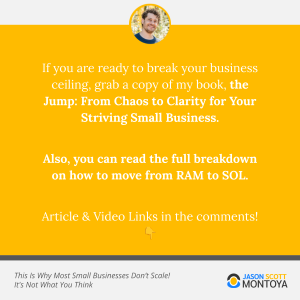
This Is Why Most Small Businesses Don’t Scale! (It's Not What You Think)
When it comes to running your business, you can run it like the wild west: gunslinging, figuring things out as you go, winging it, ad hoc, and reacting to problems. I call this Rogue Action Management (RAM) because there's no system or process in place.

The alternative, the opposite of RAM, is what I call System-Oriented Leadership (SOL). In my book, The Jump from Chaos to Clarity for Your Striving Small Business, I talk about the difference between these two. I want to introduce you to RAM so you can understand why you need System-Oriented Leadership.
Is Your Small Business Stuck?
In The Jump, we'll explore four key steps and a transformational strategy to successfully level up your small business.
The Problem with RAM (Rogue Action Management)
We want to decrease the amount of RAM over time and increase the amount of SOL over time. This is how we go from chaos to order.
Think of it like someone drowning, just trying to get air to survive. That's RAM. You can get good at operating and even thriving in the chaos, but it just burns you out. It's not sustainable for you, your team, or your clients. You'll have gray hair really fast. What we want is SOL because that's how we sustain success healthily and keep order. If you just operate as a Rogue Action Manager, you're going to fail.
Eventually, the friction created by the "wild west" of entanglement causes the business engine to seize up. We get stuck in a perpetual state of planning and not acting, striving and burning out, doing because it's always been done that way, or complaining without making things better.
To not only survive but to thrive, we must make the jump from chaos to order, from launching to sustaining, and intentionally move toward success. This jump is pushing the IDEMA flywheel (IDEMA is a framework: Ideate, Discover, Execute, Maintain, Audit). It's a cycle for every idea and every project, ensuring we're improving, not decaying. It's the conscious choice to move forward through the cycle and the accountability we foster to ensure we don't stagnate.
The jump requires that we lead and manage through effective processes and minimize RAM. When you're a startup, when it's just you or a few people, RAM can work, and you can get a lot done. But as things get more complex and bigger, that approach will actually make everything worse. Think firefighting instead of fireproofing and busywork instead of productive action.
The Need for Personal Evolution
For the transition to succeed, it will require you, the founder, to evolve as a person and a leader. You won't change your company until you change yourself. The change can't just be superficial; it must go internal. You can't grow your business until you grow yourself. Your business has hit a ceiling because you hit a ceiling.
RAM is a signal that you've hit that ceiling. Instead of growing and maturing into a system-oriented leader that can deal with and overcome complexity, you're sticking with RAM because you have control over it. When a complex system is run in a RAM way, that system will fall apart, decay, and break down, causing consequences for those dependent on it.
A National Example of RAM
Steve Kotkin, a historian, described an example of RAM at the national level, in the following panel discussion (about 38 minutes in).
He noted that in the previous Trump administration, there was a process, an interagency consensus, and the use of people like McMaster, Pompeo, and Pottinger to turn the gigantic ship on China. It was a massive, consequential achievement because there was a process, not just two thumbs (tweeting).
Now, there is no process on purpose, because one person (Trump) believes that the process inhibits them from doing things. Only 36 positions are staffed in the National Security Council, down from what used to be 400. This is a signal that Trump doesn't want anything to do with the process. What happens is you announce things with your thumbs, and then nobody implements or follows up. There is no coordinated administration. This lack of interagency process is perceived as restraining rather than empowering, which is an example of RAM at the national level.
Moving Toward System-Oriented Leadership
I don't want you to do that in your company or in your areas of influence. You must move away from RAM and more towards SOL.
To do that, it's going to require you to level up yourself. Your thinking must change.
If you think, "It's easier if I do it myself than if I teach someone else to do it," or "It's better if I do it because it gets done at a higher quality than building a system to do that," that's why you're operating in RAM and why you'll continue to hit that business ceiling.
You have to be able to let go of control, which is scary, and start to trust other people, the systems, and the process. You can start small: build small processes, get someone to do them successfully, and then add another process.
A lot of this comes down to working smarter using leverage. You're going to have to start to self-author. You have to stop living the type of life influenced entirely by outside forces. If you are a people-pleaser, for example, it's going to be very difficult to operate in a leadership role that requires you to develop and run the system, because sometimes you might have to make decisions that not everyone agrees with.
To be a system-oriented leader, you have to be willing to step out, be vulnerable, and fail. You can't be so stuck on failure that you can't try, because your identity is tied to being successful. You have to have the courage and conviction to do this.
Is Your Small Business Stuck?
In The Jump, we'll explore four key steps and a transformational strategy to successfully level up your small business.
One way to help you through this is to get clear on your personal purpose, mission, vision, and values, and those of your organization. You want to be able to separate yourself and your identity from the business. If your identity is tied up in the business, it's going to be very difficult to step outside of that business to see the system that's operating, manipulate it, and improve it. It's going to continue to bottleneck around you, which limits your success.
Put Rogue Action Management in the closet. Move away from it. Tap into it when necessary, but always be moving towards System-Oriented Leadership. Always be taking what you're doing, turning it into a process and a system that can run without you, that can allow for more people to participate. That will be the way to grow yourself and your business forward.
Share on Social Media

























